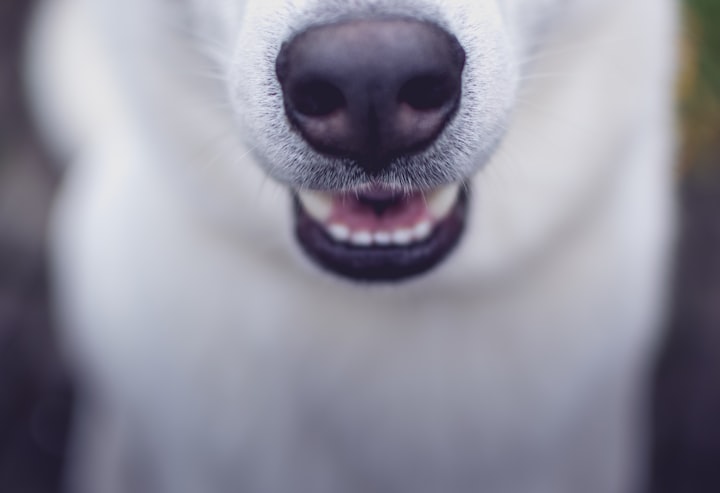The Nose Knows
The dog's sense of smell

Which of the five senses is the most important to you? Is it your sense of taste, smell, touch, sight, or hearing? If you are like most people, you probably answered either sight or hearing. If you asked your dog, however, his choice would be the sense of smell.
The dog’s nose is thousands of times more sensitive than our own noses. Have you ever noticed how dogs constantly have their noses to the ground when they’re walking outside? Maybe you’ve wondered why dogs always greet each other with a sniff. And you may have been told to put out your hand when meeting a new dog before petting it. That’s because a dog makes sense of its world through its nose.
Another reason the dog’s sense of smell is so amazing is that they are able to focus on a scent for a longer period of time. Think about when you walk into your house as your mother is cooking dinner. At first the scent of the chili or spaghetti sauce is very strong, but after a while you don’t notice it as much. Once humans adapt to the smell, we stop recognizing it.
Unlike humans, dogs have an additional olfactory tool that increases their ability to smell. Called Jacobsen’s organ, it serves as a secondary olfactory system designed specifically for chemical communication.
People have always used dogs to assist them when hunting animals for food. Today the dog’s acute sense of smell helps us with many important tasks.

For example, there are search and rescue dogs. Some of these dogs work in the airport and help detect contraband, such as illegal drugs or bombs. Others work with police officers. The police train their canine partners to track down criminals that are hiding from the law. Also in times of disaster, such as after an earthquake, they can help find survivors that may not be easily visible by the eye.

An exciting area that dogs are helping us with is detecting cancer cells. With a sense of smell researchers estimate is between 10,000 and 100,000 times greater to ours, dogs can detect cancer far earlier in the disease’s progress. Some research shows that dogs can be trained to detect cancer in its earliest stages, even faster than scientific equipment. This would allow people to begin fighting the disease earlier. The idea of using dogs to detect cancers was proposed for melanomas in 1989, and since then, their cancer-detecting skills have outshone machine-based odor analysis. One 2015 study showed that disease-sniffing dogs detected prostate cancer from urine samples with 98–99 percent accuracy. Additionally, some dogs are trained to use their sniffers to identify diabetes.
You can train your own dog to play some fun “nose” games with you at home. Begin by putting a treat or his favorite toy in plain sight and tell him to “find it.” When he takes it, be sure to reward him by giving him a lot of praise. When he gets used to that, try hiding the object out of sight such as underneath a pillow or blanket. Soon, the command “find it” will turn into an exciting game that will bring you and your furry best friend even closer.
Another recommended activity to enjoy with your dog is the sport of Barn Hunt. Your dog has to use his or her nose to locate rats (safely enclosed in aerated tubes) hidden in a maze of straw or hay. Since sniffing is such a pleasurable activity for dogs, they adore this sport.

So, the next time you see that moist black nose twitching in the air, think about what a fascinating and helpful tool it actually is.
About the Creator
Jennifer Christiansen
Animal advocate, traveler, and bibliophile. Lover of all things dark and romantic.






Comments
There are no comments for this story
Be the first to respond and start the conversation.